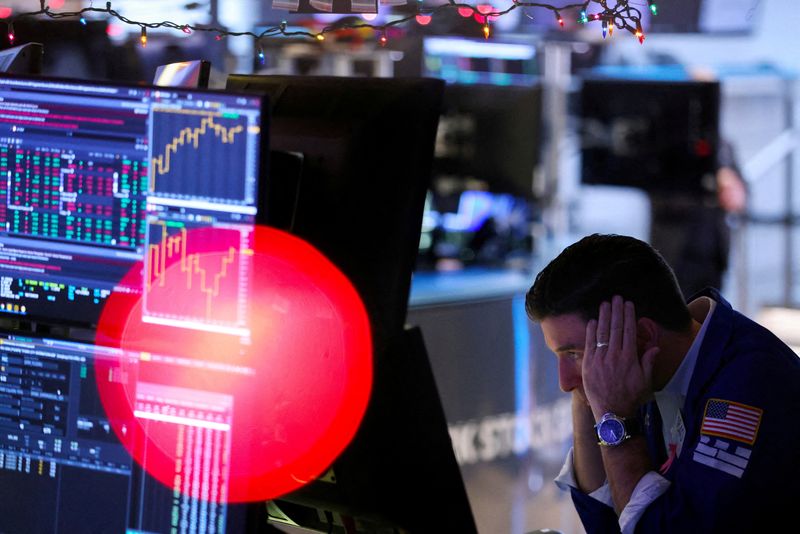By Laura Matthews and Sinead Cruise
NEW YORK/LONDON (Reuters) - The looming introduction of a shorter settlement cycle for U.S. securities is causing headaches for international fund managers, who face staffing problems, the prospect of holding more cash and raised foreign exchange risk as they prepare to comply.
Introduced to lessen the risks of unsettled trades after periods of volatility, the coming change will see securities transactions settle one business day after the trade, or T+1, rather than two.
The move, which came after the 2021 plunge in GameStop (NYSE:GME), is due to take place on May 28 in the U.S.
However, it places the country at odds with much of the rest of the world where the typical cycle is T+2. As a result, market participants have been rethinking their processes to avoid transaction failures and higher trading expenses, according to custodians, traders and consultants.
"(The transition) is not going to be without its costs," said Ben Springett, head of European electronic and program trading at Jefferies.
"You'd ... expect there to be a requirement for a greater amount of cash balances in funds to bridge any potential gaps, and cash mismatches," said Springett. "So, that will come at a detriment to fund performance."
The Depository Trust & Clearing Corporation (DTCC), which provides securities clearing and settlement in U.S. financial markets, has been working to prepare with industry bodies including the Investment Company Institute (ICI).
Tom Price, managing director and head of technology, operations and business continuity at Securities Industry and Financial Markets Association said that while T+1 was a "complicated and complex initiative" there were "risk reduction and operational benefits" for the industry.
RJ Rondini, director of securities operations at ICI said that for the U.S. securities market, "the overall reduction in capital far outweighs the actual absolute value of the increases in risk in all of these other areas."
DTCC declined comment. A paper it published on Feb. 28 said market participants must accelerate their preparations.
TRADING HOURS
The shortened cycle could cause operational challenges such as potential dislocation in FX trades. Foreign investors have to buy dollars to fund U.S. securities transactions.
Nathan Vurgest, director of trading at Record Financial Group said he is looking at whether FX costs would increase if more trades are done in the late U.S. period should liquidity move away from the London morning.
The European Funds and Asset Management Association (EFAMA) said earlier this month that faster U.S. settlement posed a "systemic risk" to Europe, noting the very limited window that non-U.S. market participants will have to access to CLS, the world's largest multi-currency settlement system for FX trades.
According to EFAMA, asset managers trading up to the U.S. close have just two hours to confirm those trades and submit them to CLS. EFAMA members polled said they expected to have to settle $50-70 billion of daily FX trades outside the safety of CLS, leading to calls to extend the CLS cut-off time.
Jefferies' Springett said some non-U.S. participants were weighing contingencies including setting up outposts in the U.S. or working U.S. hours.
Shortening the cycle could have other knock-on effects such as increasing demand for short-term financing. Typically, some investors must wait to receive cash from one market before they can buy securities in another, but those who sell international securities to buy into the U.S. may find themselves with a cash shortfall for a day.
This could increase the use of the overnight repurchase agreements but shift credit risk - the danger that a counterparty cannot pay its obligations on time and in full - onto banks in that space, said Adam Watson, head of commercial product for custody services at BNY Mellon (NYSE:BK).
"That is going to force portfolio managers to start thinking about 'do I go to the overnight repo market, or ... are my custodians able to extend me the credit overnight?'" said Watson.
Custodians, safekeepers of client assets, typically provide clients with short-term credit in the form of intraday liquidity, and on an exceptional basis overnight funding, to help settle across different systems and time zones.
But this type of lending is usually limited to the processing of clients' securities or payment transactions and is not generally committed, and is therefore not a guaranteed extension of credit, Watson said.
KNOCK-ON EFFECTS
There could be other consequences. Global index funds such as exchange-traded funds with a significant mix of assets having mismatched settlement could also face disruption, managers said.
Steve Fenty, head of currency management at State Street (NYSE:STT) Global Markets, said that when there is disharmony across a fund's settlement cycle and its underlying assets, managers might consider splitting up settlement cycles between funds that have a high proportion of U.S. assets underlying versus more diversified global funds.
The change could also reduce liquidity in equities markets, said Josh Galper, managing principal at capital markets consultancy Finadium, as a shortened time frame in the U.S. could decrease the time to recall securities that were loaned to short sellers.

"It is often overlooked how much liquidity short selling and securities lending delivers to equity markets," Galper said. "It's the type of thing that you know it when its gone."
(This story has been refiled to fix a broken hyperlink in paragraph 10)